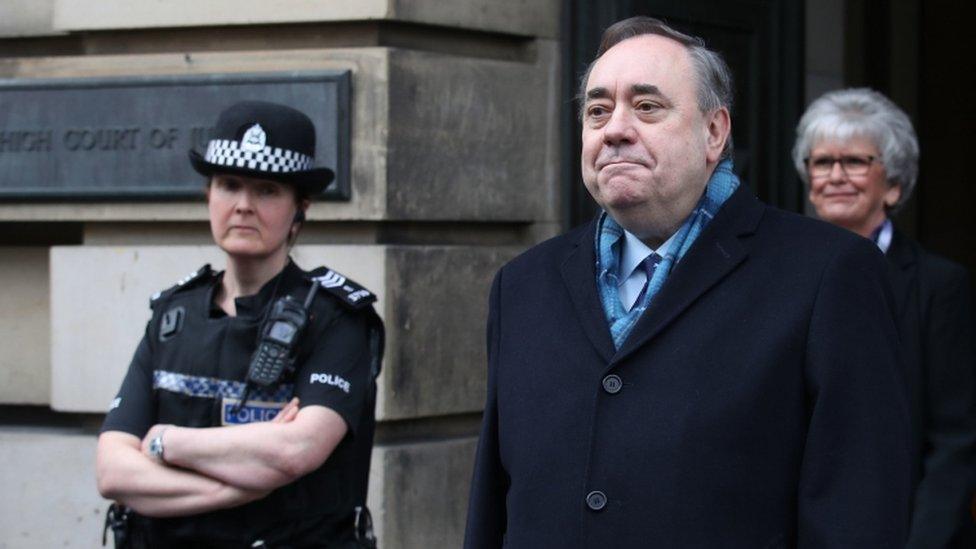Alex Salmond trial: What is the political fallout?
- Published
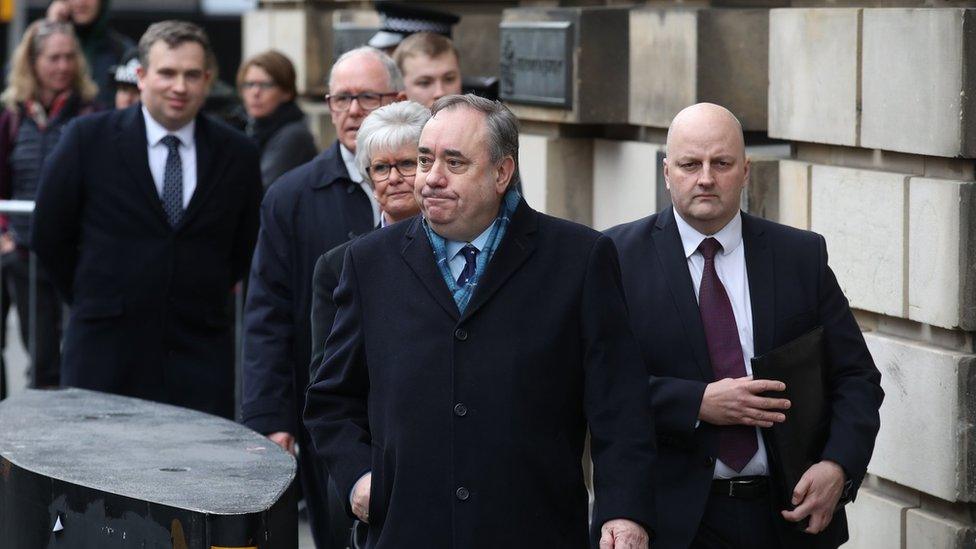
Alex Salmond has walked free from court - what happens next?
Alex Salmond has walked free from the High Court after being acquitted of charges of sexual assault - but he has made clear that this is far from the end of the matter. With a series of inquiries in the pipeline, what is going to come next?
In the first instance, very little is going to happen. Politics is essentially on hold while the country is in the grip of the coronavirus crisis - there are frankly far more important things to be dealing with right now.
But there is already much activity beneath the surface, with both opposition politicians and some within the SNP starting to pose questions. First Minister Nicola Sturgeon has said she will answer many of them in due course.
What did we learn during the trial which could give an indication of the political fallout from the case?
To start at the end of the trial, what did Mr Salmond mean when he said outside court that there was "certain evidence I would have liked to have seen led in this trial" which had not come out?
This almost certainly refers to the limits placed on the questions which can be asked of complainers in sexual offences trials. Primarily this refers to questioning about their sexual history, but it can also extend to other matters.
There was much debate in pre-trial hearings - which could not be reported until after the trial itself - about what could be asked of the complainers.
The defence wanted to press some of the women about later developments, around the judicial review process where Mr Salmond challenged the government over its handling of internal complaints against him.
Lady Dorrian ruled that this would remove the focus of the trial to another matter - which took place a decade after some of the charges - and would distract the jury from the merits of the charges themselves.
The defence actually tried to challenge this decision with another judge, but were rebuffed by Lady Stacey in similar terms.
Outside court, Mr Salmond said there was more evidence to come to light
Why did the defence want to talk about the judicial review? Because they believed it was central to a politically-driven conspiracy against Mr Salmond.
There was little direct talk of this in the trial itself, Gordon Jackson's assertions that "this stinks" in his closing speech aside. Mr Salmond said some allegations had been "deliberate fabrications for a political purpose", but the jury were never told why this might have been the case.
To again look to the pre-trial hearings, here the defence were able to be much clearer. Mr Jackson said there had been "a great deal of egg on faces" in government over the "spectacular" collapse of its case in the judicial review.
He said that after this, people working within the current administration turned their attention "very directly" to the criminal probe and "sought to influence that process to discredit the former first minister".
Text messages were read out saying Mr Salmond's ire over the botched internal probe risked "bringing down Nicola on the way".
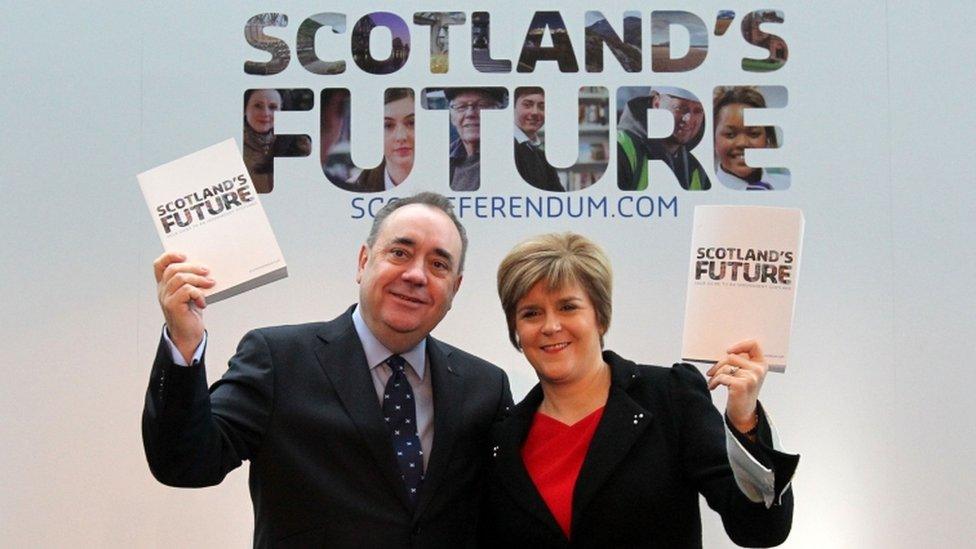
What does the future hold for the relationship between Alex Salmond and Nicola Sturgeon?
Where might this evidence come out, then, if not in court?
MSP Alex Neil has called for a "judge led public inquiry" - post-coronavirus - to find out if there was a "criminal" conspiracy to "do in Alex Salmond".
However, a series of inquiries are already waiting in the wings, having been set up in 2019 before being put on ice after criminal charges were brought.
A parliamentary inquiry is due to examine the role of Nicola Sturgeon and her advisors in the internal inquiry, which the government conceded had been unlawful shortly before Mr Salmond's legal challenge was to be heard at the Court of Session.
Ms Sturgeon insisted at the time that the process was "completely robust" and had only fallen down in one "deeply regrettable" area in the case of Mr Salmond.
However, one of the complainers in the trial also hit out at the government process, saying it was "flawed" and that she didn't want to be part of the internal inquiry because there was too much "risk" around it.
This is almost certainly set to be the focus of much of the parliamentary inquiry - along with the questions posed repeatedly at Holyrood back in 2019, about what Ms Sturgeon knew and when.
Nicola Sturgeon says she will answer questions about the case in due course
The first minister has also referred herself to a standards panel who will decide whether she broke the ministerial code, external during the government investigation of her predecessor.
Ms Sturgeon told MSPs she had face-to-face meetings with Mr Salmond and spoke to him on the phone while the probe was ongoing, but insisted that she "acted appropriately and in good faith" at all times.
Ms Sturgeon previously insisted that she first heard about complaints against Mr Salmond at a meeting at her house in Glasgow on 2 April, 2018. She has also said this meeting was party business, rather than that of the government - negating the need for official notes to be taken.
This meeting was facilitated by Mr Salmond's former chief of staff, Geoff Aberdein. And while giving evidence under oath, Mr Aberdein said he had held an earlier meeting with Ms Sturgeon at her Holyrood office, on 29 March.
The question eliciting this revelation appeared to be specifically prompted by Mr Salmond, who called his QC across for consultation before it was asked. Clearly, the former first minister thinks this a significant point.
What actually happened at that meeting was not discussed in court, but the fact it was held sparks immediate questions. If it was in the first minister's parliamentary office, was it government business? And why did we only hear about it via testimony in court?
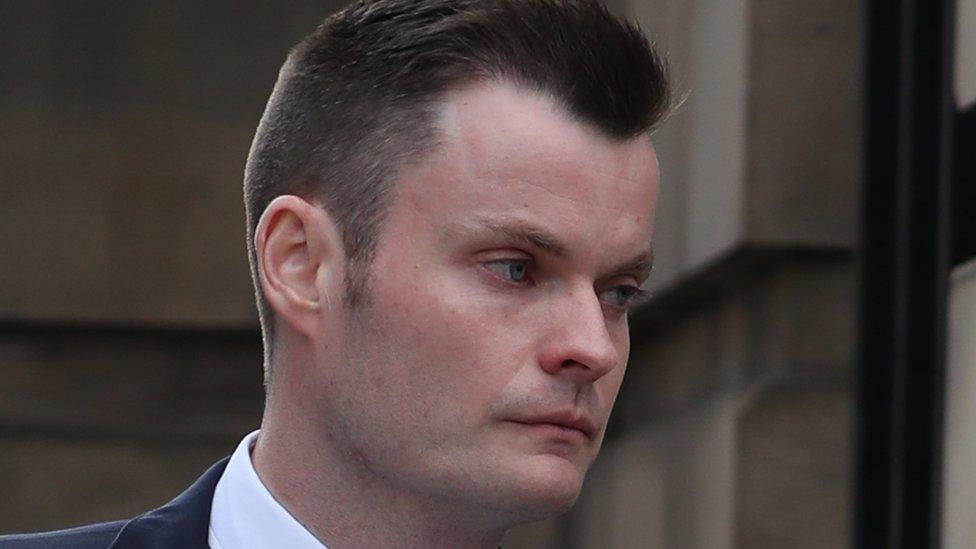
Geoff Aberdein told the jury he had met Ms Sturgeon at her Holyrood office - a meeting not previously disclosed by the first minister
And outside of government itself, there have also been questions asked about the role of the SNP.
Mr Salmond's supporters were quick to comment on the verdict, with Kenny MacAskill calling for resignations - without specifying whose - and Joanna Cherry demanding an independent inquiry into the party's internal complaints procedure.
One complainer, Woman H, said she had made a complaint to the SNP specifically so it would be on file for vetting purposes should Mr Salmond ever run for office again.
The court heard she had received a text message from a party official saying "we'll sit on that and hope we never need to deploy it".
Woman H was clear that this was at her request, but questions are sure to be asked about a process which saw a complaint of sexual assault effectively buried. What else might political parties be "sitting on"?
Mr Salmond quit the party at the point he launched his judicial review. Will he now seek to rejoin it? Or has the rift with the current leadership grown too stark?
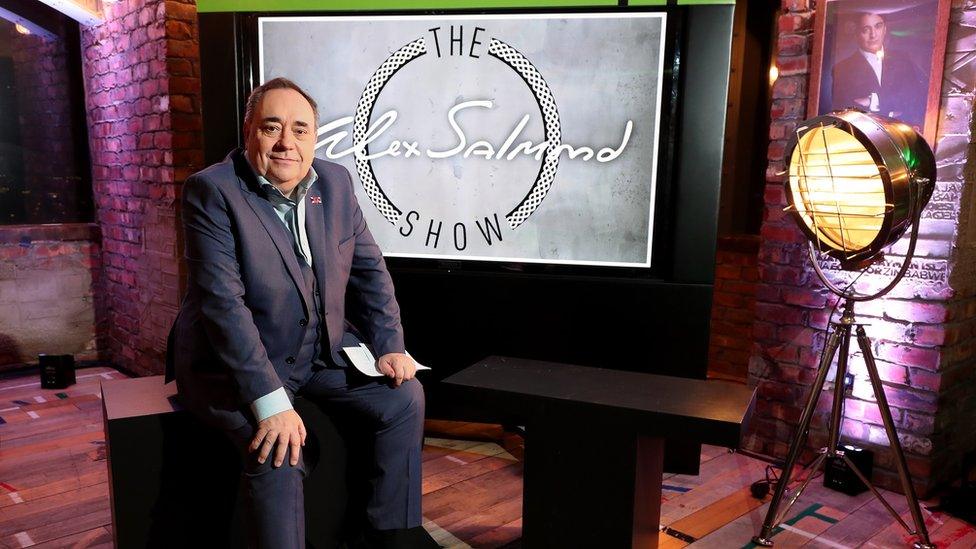
Mr Salmond told the court he had "retired" as a politician, but could still have influence through ventures like his TV show
Finally, while he has walked free from court acquitted on all counts, has Mr Salmond's reputation come through the trial intact?
He will not mind that one verdict was "not proven" rather than not guilty - in practice, they mean the same thing, that he is innocent in the eyes of the law.
He is free to return to normal life and society - albeit a society currently in lockdown - and will presumably keep his arm in the political debate while presenting his TV show on Russian channel RT.
But the defence case readily admitted that he had not always behaved well. Mr Jackson said throughout that the "touchy-feely" Mr Salmond could certainly act inappropriately, and led witnesses who called him "extraordinarily pugnacious" and "extremely demanding".
The QC said in his closing speech that the former first minister "could certainly have been a better man" - but that none of this made him a criminal, something the jury accepted.
Mr Salmond admitted to having a "sleepy cuddle" with one complainer, and what Mr Jackson called "a bit of how's your father" with another - both members of his staff far younger than he, and neither of them his wife.
The defence also never really attempted to dispel the slightly raucous image of Bute House drawn by the prosecution, of exotic liquors being poured late at night after celebrity dinners and staff being invited to do paperwork in the bedroom.
To stress again, a jury has ruled that none of this was criminal conduct. But that does not mean nobody will question it. The SNP's equalities convener has already called elements of it "deeply inappropriate, external", although Mr Salmond is also sure to fight for his reputation in light of the verdict.
While the trial may be over, the political fallout is only just beginning. This is a difficult moment for all concerned - ultimately, very few people may come out of this affair well.
- Published23 March 2020
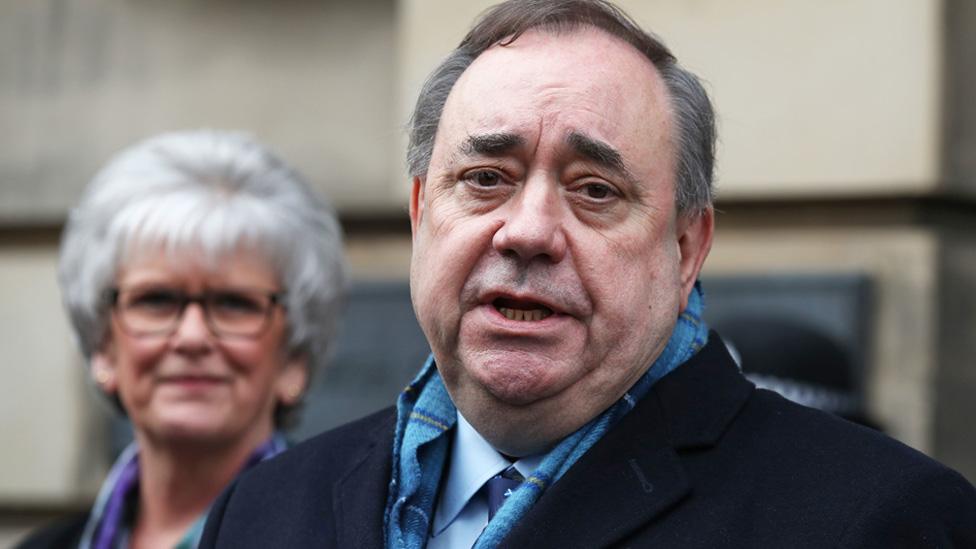
- Published23 March 2020
